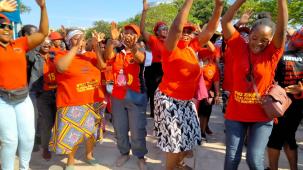On 25 January 2022, ESCR-Net sent a collective letter to call on the Indian government to stop the land grab and violent repression of villagers in the Indian state of Odisha.
The repression is taking place in the context of community resistance to the proposed construction of a steel plant by Indian corporation, JSW Utkal Steel Ltd. According to the villagers, the project, if implemented, will destroy the livelihood of 40,000 farmers, agricultural workers and fisher folk as well as having devastating environmental impacts.
The community resistance has been met by severe repression by the police and high levels of criminalization of villagers on false charges. The leader of the movement resisting the land grab, Debendra Swain, was arrested and allegedly tortured in police custody.
The land designated for the steel plant, was previously designated for a similar project by Korean corporation, POSCO. As a response to the resistance by communities with the support of international human rights organizations and several UN mandate holders, POSCO withdrew from the project in 2017. However, rather than returning the land to the villagers, the government handed it over to JSW Utkal Steel Ltd.
ESCR-Net’s Collective Demands:
Given the gravity of the situation, ESCR-Net call on the government of India to:
- Immediately put an end to the repression of communities resisting the JSW Utkal Steel Ltd project in Odisha. This should include withdrawing the massive police presence from the area and conducting independent investigations into all reports of police abuse. Those responsible must be held to account. Similarly, ensure that those in need of medical attention gain access without fear of arrest or reprisals.
- Free human rights defenders incarcerated on fabricated cases. Drop all fabricated cases against human rights defenders.
- Put an end to attempts at forcibly evicting villagers from their lands and provide adequate compensation for victims including for destruction of betel vine and other crops.
- Terminate the pending agreement with JSW Utkal Steel Ltd given the failure to secure community consent for the project through the Gram Sabha as well as failure to obtain environmental clearance for the project.
- Respect and implement the provisions of the Scheduled Tribes and Other Traditional Forest Dwellers (Recognition of Forest Rights) Act, 2006, including the right of forest dwellers to live in the forest and dispose of natural resources as well as recognizing Gram Sabha decisions.
- Independently investigate all accusations of torture, including accusations of torture of Debendra Swain, while in police custody. Those responsible must be held accountable. Ratify the UN Convention against Torture and Other Cruel, Inhuman or Degrading Treatment or Punishment, which India signed in 1997.
- Ensure an enabling environment for Human Rights Defenders in India, including through creation of national legislation, as called for in the UN Declaration on the Right and Responsibility of Individuals, Groups and Organs of Society to Promote and Protect Universally Recognized Human Rights and Fundamental Freedoms and by supporting the ongoing negotiations of a legally binding instrument on business and human rights.



